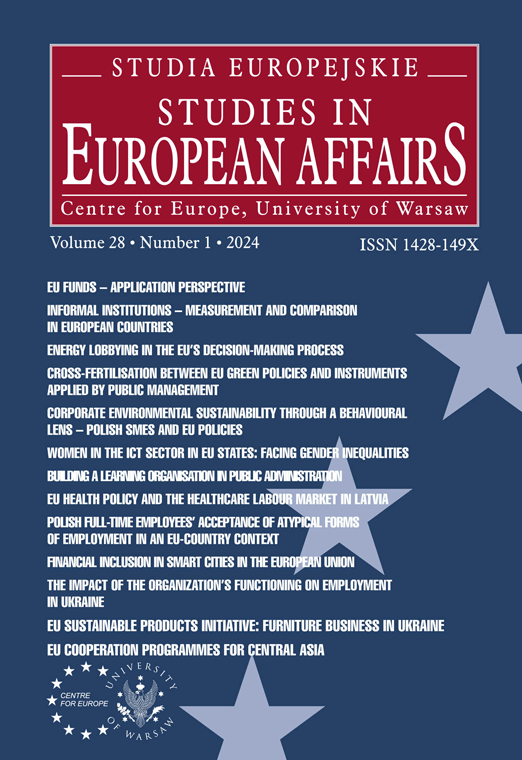
ISSUE: 1/2024
- Volume 28
- Number 1
- 2024
Subscribe NEWSLETTER
Studia Europejskie –
Studies in European Affairs
ISSN: 1428-149X
e-ISSN: 2719-3780
License
Articles published in the journal are under a Creative Commons Attribution – Non Commercial – No Derivatives 4.0 International License
International Benchmarking as a Method for Building a Learning Organisation in Public Administration. A Case Study of Phytosanitary Services in Europe
Abstract
The project analysed the functioning of the State Plant Protection and Seed Inspection Service (SPHSIS), and this article presents a study of the international benchmarking of public administration (6 seed Inspections from European Union countries were analysed). The research question posed by the authors of this article is: how did this tool help in the development and strategy planning of a public administration unit? The project used a number of research steps, both directly dedicated to benchmarking and interviews with Service recipients or Inspection staff. The following recommendations for Inspections emerge from a comparative analysis:
1) the introduction of the digitalisation of services, which may enable an increase in customer orientations,
2) legal changes in Poland’s Inspection Service – increasing powers and building a single, national Food Agency.
3) Seed Inspection Service clients suggest increasing pro-export attitudes among officials.
References
Androniceanu, A., Georgescu, I. and Kinnunen J. (2022) “Public administration digitalization and corruption in the EU member states. A comparative and correlative research analysis”, Transylvanian Review of Administrative Sciences. No. 65 E, pp. 5–22. DOI: 10.24193/tras.65E.1.
Braybrooke, D. and Lindblom, Ch. (1963) A strategy of Decision. Policy Evaluation as a Social Process. New York: The Free Press.
Burlacu, S., Popescu, M.L., Diaconu, A. and Sârbu, A. (2021) “Digital Public Administration for Sustainable Development”, European Journal of Sustainable Development. Vol. 10(4), pp. 33–40. DOI: 10.14207/ejsd.2021.v10n4p33.
Cyert, R.M. and March, J.G. (1963) A Behavioral Theory of the Firm. Englewood Cliffs, NJ: Prentice-Hall.
Czarniawska, B. (2014) “Why I think shadowing is the best field technique in management and studies”, Qualitative Research in Organizations and Management. An International Journal. Vol. 9(1), pp. 90–93. DOI: 10.1108/QROM-02-2014-1198.
Korunka, Ch., Scharitzer, D., Carayon, P., Hoonkker, P., Sonnek, A. and Sainfort, F. (2007) “Customer orientation among employees in public administration: A transnational, longitudinal study”, Applied Ergonomics. Vol. 38, pp. 307–315. DOI: https://doi.org/10.1016/j.apergo.2006.04.019.
Lewin, K. (1946) “Action Research and Minority Problems”, Journal of Social Issues. Vol. 2(4), pp. 34–46. DOI: 10.1111/j.1540-4560.1946.tb02295.x.
Lindblom, C.E. (1959) “The science of muddling through”, Public Administration Review. Vol. 19, pp. 79–88. DOI: 10.2307/973677.
Marsick, V.J. and Watkins, K.E. (2003) “Demonstrating the Value of an Organization’s Learning Culture: The Dimensions of the Learning”, Advances in Developing Human Resources. Vol. 5(2), p. 132. DOI: 10.1177/1523422303005002002.
Miles, M., Huberman, A.M. and Saldana, J. (2014) Qualitative Data Analysis. Thousand Oaks: SAGE.
Morgan, G. (1986) Images of Organization. Beverly Hills, CA: Sage.
Moynihan, D.P. and Landuyt, N. (2009) “How Do Public Organizations Learn? Bridging Cultural and Structural Perspectives”, Public Administration Review. Vol. 69(6), pp. 1097–1105. DOI: 10.1111/j.1540-6210.2009.02067.x.
Mumford, A. (1995) “The learning organization in review”, The Learning Organization in Review. Vol. 27(1), p. 5. DOI: 10.1108/00197859510078389.
Nelson, R.R. and Winter, S.G. (1982) An Evolutionary Theory of Economic Change. Cambridge, MA: Harvard University.
Nonaka, I. and Takeuchi, K. (1995) The Knowledge Creating Company: How Japanese Companies Create the Dynamics of Innovation. Oxford: Oxford University Press. DOI: https://doi.org/10.1093/oso/9780195092691.001.0001.
Pasieczny, J. and Rosiak, T. (2021) W kierunku organizacji uczącej się. Transformacja organizacyjna na przykładzie jednostki administracji publicznej. Warszawa: Wydawnictwa Uniwersytetu Warszawskiego. DOI: 10.7172/978-83-235-5506-3.swwz.5.
Pasieczny, J. and Rosiak, T. (2022) “Barriers to Implementing the Concept of Learning Organization in Public Administration – the Example of PIORiN”, Annales Universitatis Mariae Curie-Skłodowska, Sectio H. Vol. 56(5). DOI:10.17951/h.2022.56.5.171-184.
Quinn, J.B. (1980) Strategies for Change: Logical Incrementalism. Irwin Homewood.
Rosiak T. and Postuła, A. (2022) “Organizational Learning Systems in the Hybrid Work Model. Lessons Learned from the Action Research Based on FITOEXPORT Project”, Organization and Management. Vol. 190(1), pp. 131–139.
Senge, P.M. (1990) The Fifth Discipline: The Art and Practice of the Learning Organization. New York: Broadway Business.
Siegel, S. (1957) “Level of aspiration and decision making”, Psychological Review. Vol. 64(4), pp. 253–262. DOI: 10.1037/h0049247.
Simon, H.A. (1955) “A behavioral model of rational choice”, The Quarterly Journal of Economics. Vol. 69(1), pp. 99–118. DOI: 10.2307/1884852.
Steinbruner, J.D. (1974) The Cybernetic Theory of Decision. Princeton, NJ: Princeton University Press. DOI: 10.1515/9781400823796.
Stoddard, D.B. and Jarvenpaa, S.L. (1995) “Business Process Redesign: Tactics for Managing Radical Change”, Journal of Management Information Systems. Vol. 12(1), pp. 181–107. DOI: 10.1080/07421222.1995.11518071.
Sułkowski, Ł. (2003) “O związkach między kulturą organizacyjną a organizacją uczącą się”, Przegląd Organizacji. No. 4, pp. 9–11. DOI: 10.33141/po.2003.04.01.
Van de Ven, A.H. and Polley, D. (1992) “Learning while innovating”, Organization Science. Vol. 3(1), pp. 92–116. DOI: 10.1287/orsc.3.1.92.
Vince, R. and Saleem, T. (2004) “The impact of caution and blame on organizational learning”, Management Learning. Vol. 35(2), pp. 133–154. DOI: 10.1177/1350507604043022.
DOI: 10.33067/SE.1.2024.7
Language: English
Pages: 131-147
How to Cite:
Harvard
Kłobukowska, K. and Kłobukowski, P. and Rosiak, T. (2024) "International Benchmarking as a Method for Building a Learning Organisation in Public Administration. A Case Study of Phytosanitary Services in Europe". Studia Europejskie – Studies in European Affairs, 1/2024, pp. 131-147. DOI: 10.33067/SE.1.2024.7